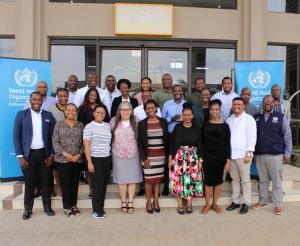HIV Health Experts convene in Mahalapye to assess HIV Drug Resistance in Botswana
For several years, Botswana has made significant strides in its HIV treatment program, managing to control the spread of the virus effectively. However, with longevity of the program, introduces the potential for the virus to mutate and thus resistance to the current medications not work as effectively to suppress. , thus a growing concern over the rise of drug resistance now threatens this progress. To address this pressing issue, a Technical Working Group (TWG) on HIV Drug Resistance (HIVDR) convened in Mahalapye for a five-day meeting beginning on October 21, 2024. The group gathered to assess the current situation and develop strategic actions to mitigate the threat of HIV drug resistance.
Hosted by the Ministry of Health (MoH) in collaboration with the World Health Organization (WHO), the meeting was supported by key stakeholders who are members of the TWG, and were from organisations such as CDC-Botswana, the Botswana University of Maryland School of Medicine Health Initiative (BUMMHI), the Botswana Harvard Partnership, and the private sector. The aim was to review surveillance reports based on studies conducted in the country and to follow WHO guidelines to combat the emerging challenge of drug resistance.
Dr. Bornapate Nkomo, Head of HIV Programs at the Ministry of Health, emphasized that Botswana's success in managing HIV has always been driven by the collaboration of stakeholders across sectors. He highlighted that continued cooperation is more critical than eve r in tackling the growing challenge of HIV drug resistance. “Together, we can strengthen surveillance systems and improve treatment protocols, safeguarding the success of our antiretroviral therapy (ART) programs,” said Dr. Nkomo.
The HIV focal point in the WHO Botswana country Office, Dr. Tebogo Madidimalo explained that the genetic mutations of HIV contribute to drug resistance, impacting the efficacy of current antiretroviral drugs. He noted that the meeting comes at an opportune time as Botswana is preparing for demonstrating capacities for the Botswana HIV Reference Laboratory , having been designated the WHO Collaborating Centre for HIV Drug Resistance, as the end of year one report on designation status will be submitted by end of November 2024. Addressing this issue promptly will help preserve the effectiveness of ART and prevent the spread of drug-resistant HIV strains, including building confidence on the Botswana Laboratories to be able to detect these new mutated variants.
Dr. Madidimalo also reiterated that the report from this meeting is a call to action for continued collaboration, ensuring Botswana remains a leader in the global fight against HIV while achieving the UNAIDS 95-95-95 targets. The TWG's recommendations are expected to include stronger interventions to promote patient adherence to treatment, community support, and efforts to reduce stigma, all of which are crucial to curbing the development of drug resistance.
Botswana’s ongoing efforts, aligned with WHO’s Global Action Plan on HIV Drug Resistance, reinforce the country’s commitment to maintaining effective treatment and protecting the progress made in the fight against HIV/AIDS.



